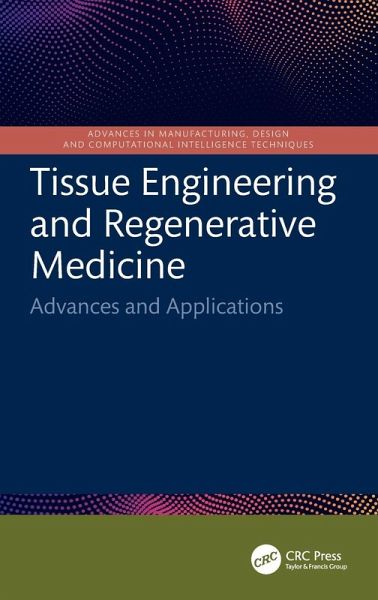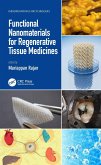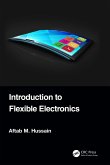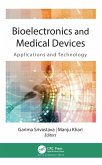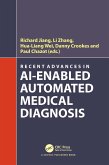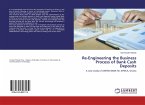Tissue Engineering and Regenerative Medicine
Advances and Applications
Herausgeber: Kumar, Ashwani; Singh, Subhash; Kamble, Shailesh D.; Dwivedi, Gaurav
Tissue Engineering and Regenerative Medicine
Advances and Applications
Herausgeber: Kumar, Ashwani; Singh, Subhash; Kamble, Shailesh D.; Dwivedi, Gaurav
- Gebundenes Buch
- Merkliste
- Auf die Merkliste
- Bewerten Bewerten
- Teilen
- Produkt teilen
- Produkterinnerung
- Produkterinnerung
The text emphasizes the technological advancements in tissue engineering related to biomaterials and biomanufacturing techniques and discusses topics such as 3D bioprinting, process parameter optimization, CNN for stem cell imaging, diabetes risk prediction & Parkinson's disease detection using machine learning, etc.
Andere Kunden interessierten sich auch für
![Evolution of Machine Learning and Internet of Things Applications in Biomedical Engineering Evolution of Machine Learning and Internet of Things Applications in Biomedical Engineering]() Evolution of Machine Learning and Internet of Things Applications in Biomedical Engineering171,99 €
Evolution of Machine Learning and Internet of Things Applications in Biomedical Engineering171,99 €![Functional Nanomaterials for Regenerative Tissue Medicines Functional Nanomaterials for Regenerative Tissue Medicines]() Functional Nanomaterials for Regenerative Tissue Medicines225,99 €
Functional Nanomaterials for Regenerative Tissue Medicines225,99 €![Introduction to Flexible Electronics Introduction to Flexible Electronics]() Aftab M HussainIntroduction to Flexible Electronics181,99 €
Aftab M HussainIntroduction to Flexible Electronics181,99 €![Bioelectronics and Medical Devices Bioelectronics and Medical Devices]() Bioelectronics and Medical Devices202,99 €
Bioelectronics and Medical Devices202,99 €![Recent Advances in AI-enabled Automated Medical Diagnosis Recent Advances in AI-enabled Automated Medical Diagnosis]() Recent Advances in AI-enabled Automated Medical Diagnosis192,99 €
Recent Advances in AI-enabled Automated Medical Diagnosis192,99 €![Civil Engineering Contractual Procedures Civil Engineering Contractual Procedures]() Allan AshworthCivil Engineering Contractual Procedures182,99 €
Allan AshworthCivil Engineering Contractual Procedures182,99 €![Re-Engineering the Business Process of Bank Cash Deposits Re-Engineering the Business Process of Bank Cash Deposits]() Yaw Amoah-YeboahRe-Engineering the Business Process of Bank Cash Deposits29,99 €
Yaw Amoah-YeboahRe-Engineering the Business Process of Bank Cash Deposits29,99 €-
-
-
The text emphasizes the technological advancements in tissue engineering related to biomaterials and biomanufacturing techniques and discusses topics such as 3D bioprinting, process parameter optimization, CNN for stem cell imaging, diabetes risk prediction & Parkinson's disease detection using machine learning, etc.
Hinweis: Dieser Artikel kann nur an eine deutsche Lieferadresse ausgeliefert werden.
Hinweis: Dieser Artikel kann nur an eine deutsche Lieferadresse ausgeliefert werden.
Produktdetails
- Produktdetails
- Verlag: Taylor & Francis Ltd
- Seitenzahl: 400
- Erscheinungstermin: 15. Mai 2025
- Englisch
- Abmessung: 234mm x 156mm
- ISBN-13: 9781032881430
- ISBN-10: 1032881437
- Artikelnr.: 71850729
- Herstellerkennzeichnung
- Libri GmbH
- Europaallee 1
- 36244 Bad Hersfeld
- gpsr@libri.de
- Verlag: Taylor & Francis Ltd
- Seitenzahl: 400
- Erscheinungstermin: 15. Mai 2025
- Englisch
- Abmessung: 234mm x 156mm
- ISBN-13: 9781032881430
- ISBN-10: 1032881437
- Artikelnr.: 71850729
- Herstellerkennzeichnung
- Libri GmbH
- Europaallee 1
- 36244 Bad Hersfeld
- gpsr@libri.de
Shailesh D. Kamble is working as Associate Professor in department of Artificial Intelligence and Data Science in Indira Gandhi Delhi Technical University for Women, Delhi, India. He received Bachelor of Engineering degree in Computer Technology from Yeshwantrao Chavan College of Enginering, Nagpur, India under the Rashtrasant Tukdoji Maharaj Nagpur University, Nagpur, India. He received Master of Engineering degree from Prof Ram Meghe Institute of Technology and Research, formerly known as College of Engineering, Badnera under Sant Gadge Baba Amravati University, Amravati, India. He received his doctoral degree in Computer Science Engineering under Department of Computer Science Engineering from R.T.M. Nagpur University, Nagpur, India on 13th November 2018. He was working as the Associate Professor in Department of Computer Science and Engineering at Yeshwantrao Chavan College of Engineering, Nagpur, India. He has over 20 years of teaching and research experience. His current research interests include image processing, video processing and language processing. He is the author or co-author of more than 70 scientific publications in International Journal, International Conferences, and National Conferences. He is a life member of ISTE, India and Fellow IE(I), India. Subhash Singh Dr. Singh specializes in areas such as Modification of Nano materials, thin coating, fabrication of MMCs, synthesis of 2D Materials, FSP, machining of biodegradable materials. He has published more than forty research papers in various prestigious journals. He has also authored three books and twenty book chapters. He has completed three research projects. Ashwani Kumar holds a Ph.D. in Mechanical Engineering, specializing in Mechanical Vibration and Design with a diverse and impressive career spanning over 14 years. He currently holds the position of Senior Lecturer (Gazetted Officer Group B) in Mechanical Engineering at the Technical Education Department Uttar Pradesh (under Government of Uttar Pradesh) in Kanpur, India. Prior to his current role, Dr. Kumar served as an Assistant Professor in the Department of Mechanical Engineering at Graphic Era University, Dehradun (ranked 52nd by NIRF India) from July 2010 to November 2013. Beyond his academic contributions, Dr. Kumar possesses extensive leadership and administrative experience. He has held numerous key positions within the education sector, including Coordinator for AICTE-Extension of Approval, Nodal Officer for PMKVY-TI Scheme (Government of India), Internal Coordinator - CDTP Scheme (Government of Uttar Pradesh), Industry Academia Relation Officer, Assistant Centre Superintendent (ACS) - Institute Examination Cell, Zonal Officer for Joint Entrance Examination (JEE-Diploma), and Sector Magistrate for State Assembly and General Elections. Dr. Kumar is a passionate researcher and a prominent figure in the field of academic publishing. His dedication to knowledge dissemination is evident in his role as Series Editor for seven distinguished book series published by international publisher of repute. These series encompass a wide range of topics, titled as: Advances in Manufacturing, Design and Computational Intelligence Techniques / Renewable and Sustainable Energy Developments / Smart Innovations and Technological Advancements in Mechanical and Materials Engineering / Solar Thermal Energy Systems: Advancements in Engineering, Ergonomics, and Sustainable Development / Artificial Intelligence and Machine Learning for Intelligent Engineering Systems / Computational Intelligence and Biomedical Engineering/ Renewable Green Technologies for Sustainable Energy Solutions. Dr. Kumar's editorial expertise extends beyond book series. He serves as Editor-in-Chief for the International Journal of Materials, Manufacturing and Sustainable Technologies (IJMMST, ISSN: 2583-6625), and Editor of the International Journal of Energy Resources Applications (IJERA, ISSN: 2583-6617). He has also been a guest editor for a special issue of Buildings titled as Sustainable Buildings, Resilient Cities and Infrastructure Systems (ISSN: 2075-5309, I.F. 3.1) and holds editorial board positions on eight international journals and acts as review board member of 20 prestigious (Indexed in SCI/SCIE/Scopus) international journals with high impact factor. Dr. Kumar's dedication to scholarship is further demonstrated by his prolific authorship of over 165+ articles in prestigious journals, book chapters, and conference proceedings. Additionally, he has co-authored or edited over 40+ books in Mechanical Engineering, Materials Science, and Renewable Energy Engineering. Dr. Kumar's achievements have been recognized with prestigious awards, including a Best Teacher award for excellence in academics and research. He has also successfully guided 15 students through their B.Tech., MTech, and Ph.D. theses and currently serves as an external doctoral committee member at S.R.M. University, New Delhi. Dr. Kumar is actively involved in cutting-edge research, focusing on areas such as Artificial Intelligence and Machine Learning in Mechanical Engineering, Smart Materials and Manufacturing Techniques, Thermal Energy Storage, Building Efficiency, Renewable Energy Harvesting, Sustainable Transportation, and Heavy Vehicle Dynamics. He holds four patents and frequently participates in international conferences as an invited speaker, session chair, and member of advisory boards, review boards, and program committees. Dr. Kumar's ORCID ID is 0000-0003-4099-935X. Gaurav Dwivedi has completed his B. Tech in Mechanical Engineering from IKGPTU Jalandhar, M. Tech in Energy Systems from IIT Roorkee and PhD in the field of Renewable Energy (Biofuel) from IIT Roorkee, India. He has 12 years of teaching experience in the field of Mechanical & Energy Engineering and taught various subjects like IC Engine, Thermodynamics, Fluid Machinery, Bioenergy and others at various Institute like VIT University Vellore and Amity University Noida. Currently, he is working as Assistant Professor in the Energy Centre at Maulana Azad National Institute of Technology, Bhopal India. His area of interest is Biodiesel Production methodology, enhancement in fuel properties and application of biofuel and hydrogen on engine operation. He has published more than 150 paper in various International Journal and conferences. He got more than 80 papers in SCI and Scopus Indexed Journal. He has published four books with International Publisher along with that he has contributed 12 book chapters. He got the Young Scientist award at NIT Trichy for his contribution in the field of Renewable energy. He is an active member of Institution of Engineers, India and Solar Energy Society of India and IEEE. He also served as Guest Editor for International Journal like Sustainable Energy Technology and Assessment (SETA), Material Today proceedings and Journal of Traffic and Transportation. He has currently 3 running projects, more than 45 lakhs sponsored by DST and MPCST. He also featured in "Top 2% scientist of the world from India (all fields)" (2020,2021,2022,2023) by a survey conducted by Stanford University.
1. Recent Technological Developments in Tissue Engineering. 2. The Future
of Tissue Engineering: Integrating Machine Learning, AI, and Computer
Vision. 3. 3D Bioprinting Techniques for Tissue Engineering Applications.
4. Natural Biomaterials for Tissue Engineering and Regenerative Medicine.
5. Advanced Synthetic Biomaterials for Tissue Engineering and Regenerative
Medicine. 6. Study to Analyze the Efficacy of Three Types of Polishing
Techniques on Two Commercially Available Denture Base Acrylic Resins. 7.
Detecting the Accuracy of Cancer Stem Cell in Brain Tumor. 8. User Enabled
Brain Tumor Detection. 9. CNN for Stem Cell Imaging: Existing Constraints
and Future Perspectives in Artificial Intelligence. 10. Evaluation of Focal
Solid Hepatic Lesions Using Shear Wave Elastography. 11. Diabetes Risk
Prediction System using Machine Learning. 12. Evaluation of Coronary Artery
Disease Risk Factors Among Patients with And Without Non-Alcoholic Fatty
Liver Disease. 13. Study of Relation of Blood Sugar Level with Outcome in
Acute Myocardial Infarction (Stemi and Nstemi) in Non-Diabetic Patients.
14. Detection of Parkinson's Disease Using Machine Learning. 15. Preventing
Post-Operative Urinary Retention in Elderly Males Undergoing Elective
Surgery. 16. Substantiating Random Forest Algorithm For Prognosis of
Various Infirmities. 17. Assessing the Perception of Customers Towards
Telehealth Systems & Intention To Adopt with Reference To Uttar Pradesh.
18. The Quest for Novel Drugs against COVID-19 - In-Silico Study. 19. Graph
Convolutional Network for COVID-19 Detection from X ray: Advancing Accurate
Diagnosis. 20. A Case-Control Study on the Role of Serum Magnesium Levels
in Febrile Convulsions. 21. Apache-II Score and Ranson Criteria with
Modified CT Severity Index in Predicting the Severity of Acute
Pancreatitis: A Comparative Study. 22. Comparative Study Between SpotUrine
Protein to Creatinine RatioAnd 24-Hour Urine Protein In TypeTwo Diabetic
Patients With Nephropathy. 23. The Role of Electrocardiogram in Localising
Culprit Vessel Occlusion in St-Segment Elevation Myocardial Infarction. 24.
Correlation Of Early Post-Cataract Surgery Related Oct Changes with Its
Intra-Operative Surgical Complications.
of Tissue Engineering: Integrating Machine Learning, AI, and Computer
Vision. 3. 3D Bioprinting Techniques for Tissue Engineering Applications.
4. Natural Biomaterials for Tissue Engineering and Regenerative Medicine.
5. Advanced Synthetic Biomaterials for Tissue Engineering and Regenerative
Medicine. 6. Study to Analyze the Efficacy of Three Types of Polishing
Techniques on Two Commercially Available Denture Base Acrylic Resins. 7.
Detecting the Accuracy of Cancer Stem Cell in Brain Tumor. 8. User Enabled
Brain Tumor Detection. 9. CNN for Stem Cell Imaging: Existing Constraints
and Future Perspectives in Artificial Intelligence. 10. Evaluation of Focal
Solid Hepatic Lesions Using Shear Wave Elastography. 11. Diabetes Risk
Prediction System using Machine Learning. 12. Evaluation of Coronary Artery
Disease Risk Factors Among Patients with And Without Non-Alcoholic Fatty
Liver Disease. 13. Study of Relation of Blood Sugar Level with Outcome in
Acute Myocardial Infarction (Stemi and Nstemi) in Non-Diabetic Patients.
14. Detection of Parkinson's Disease Using Machine Learning. 15. Preventing
Post-Operative Urinary Retention in Elderly Males Undergoing Elective
Surgery. 16. Substantiating Random Forest Algorithm For Prognosis of
Various Infirmities. 17. Assessing the Perception of Customers Towards
Telehealth Systems & Intention To Adopt with Reference To Uttar Pradesh.
18. The Quest for Novel Drugs against COVID-19 - In-Silico Study. 19. Graph
Convolutional Network for COVID-19 Detection from X ray: Advancing Accurate
Diagnosis. 20. A Case-Control Study on the Role of Serum Magnesium Levels
in Febrile Convulsions. 21. Apache-II Score and Ranson Criteria with
Modified CT Severity Index in Predicting the Severity of Acute
Pancreatitis: A Comparative Study. 22. Comparative Study Between SpotUrine
Protein to Creatinine RatioAnd 24-Hour Urine Protein In TypeTwo Diabetic
Patients With Nephropathy. 23. The Role of Electrocardiogram in Localising
Culprit Vessel Occlusion in St-Segment Elevation Myocardial Infarction. 24.
Correlation Of Early Post-Cataract Surgery Related Oct Changes with Its
Intra-Operative Surgical Complications.
1. Recent Technological Developments in Tissue Engineering. 2. The Future
of Tissue Engineering: Integrating Machine Learning, AI, and Computer
Vision. 3. 3D Bioprinting Techniques for Tissue Engineering Applications.
4. Natural Biomaterials for Tissue Engineering and Regenerative Medicine.
5. Advanced Synthetic Biomaterials for Tissue Engineering and Regenerative
Medicine. 6. Study to Analyze the Efficacy of Three Types of Polishing
Techniques on Two Commercially Available Denture Base Acrylic Resins. 7.
Detecting the Accuracy of Cancer Stem Cell in Brain Tumor. 8. User Enabled
Brain Tumor Detection. 9. CNN for Stem Cell Imaging: Existing Constraints
and Future Perspectives in Artificial Intelligence. 10. Evaluation of Focal
Solid Hepatic Lesions Using Shear Wave Elastography. 11. Diabetes Risk
Prediction System using Machine Learning. 12. Evaluation of Coronary Artery
Disease Risk Factors Among Patients with And Without Non-Alcoholic Fatty
Liver Disease. 13. Study of Relation of Blood Sugar Level with Outcome in
Acute Myocardial Infarction (Stemi and Nstemi) in Non-Diabetic Patients.
14. Detection of Parkinson's Disease Using Machine Learning. 15. Preventing
Post-Operative Urinary Retention in Elderly Males Undergoing Elective
Surgery. 16. Substantiating Random Forest Algorithm For Prognosis of
Various Infirmities. 17. Assessing the Perception of Customers Towards
Telehealth Systems & Intention To Adopt with Reference To Uttar Pradesh.
18. The Quest for Novel Drugs against COVID-19 - In-Silico Study. 19. Graph
Convolutional Network for COVID-19 Detection from X ray: Advancing Accurate
Diagnosis. 20. A Case-Control Study on the Role of Serum Magnesium Levels
in Febrile Convulsions. 21. Apache-II Score and Ranson Criteria with
Modified CT Severity Index in Predicting the Severity of Acute
Pancreatitis: A Comparative Study. 22. Comparative Study Between SpotUrine
Protein to Creatinine RatioAnd 24-Hour Urine Protein In TypeTwo Diabetic
Patients With Nephropathy. 23. The Role of Electrocardiogram in Localising
Culprit Vessel Occlusion in St-Segment Elevation Myocardial Infarction. 24.
Correlation Of Early Post-Cataract Surgery Related Oct Changes with Its
Intra-Operative Surgical Complications.
of Tissue Engineering: Integrating Machine Learning, AI, and Computer
Vision. 3. 3D Bioprinting Techniques for Tissue Engineering Applications.
4. Natural Biomaterials for Tissue Engineering and Regenerative Medicine.
5. Advanced Synthetic Biomaterials for Tissue Engineering and Regenerative
Medicine. 6. Study to Analyze the Efficacy of Three Types of Polishing
Techniques on Two Commercially Available Denture Base Acrylic Resins. 7.
Detecting the Accuracy of Cancer Stem Cell in Brain Tumor. 8. User Enabled
Brain Tumor Detection. 9. CNN for Stem Cell Imaging: Existing Constraints
and Future Perspectives in Artificial Intelligence. 10. Evaluation of Focal
Solid Hepatic Lesions Using Shear Wave Elastography. 11. Diabetes Risk
Prediction System using Machine Learning. 12. Evaluation of Coronary Artery
Disease Risk Factors Among Patients with And Without Non-Alcoholic Fatty
Liver Disease. 13. Study of Relation of Blood Sugar Level with Outcome in
Acute Myocardial Infarction (Stemi and Nstemi) in Non-Diabetic Patients.
14. Detection of Parkinson's Disease Using Machine Learning. 15. Preventing
Post-Operative Urinary Retention in Elderly Males Undergoing Elective
Surgery. 16. Substantiating Random Forest Algorithm For Prognosis of
Various Infirmities. 17. Assessing the Perception of Customers Towards
Telehealth Systems & Intention To Adopt with Reference To Uttar Pradesh.
18. The Quest for Novel Drugs against COVID-19 - In-Silico Study. 19. Graph
Convolutional Network for COVID-19 Detection from X ray: Advancing Accurate
Diagnosis. 20. A Case-Control Study on the Role of Serum Magnesium Levels
in Febrile Convulsions. 21. Apache-II Score and Ranson Criteria with
Modified CT Severity Index in Predicting the Severity of Acute
Pancreatitis: A Comparative Study. 22. Comparative Study Between SpotUrine
Protein to Creatinine RatioAnd 24-Hour Urine Protein In TypeTwo Diabetic
Patients With Nephropathy. 23. The Role of Electrocardiogram in Localising
Culprit Vessel Occlusion in St-Segment Elevation Myocardial Infarction. 24.
Correlation Of Early Post-Cataract Surgery Related Oct Changes with Its
Intra-Operative Surgical Complications.

